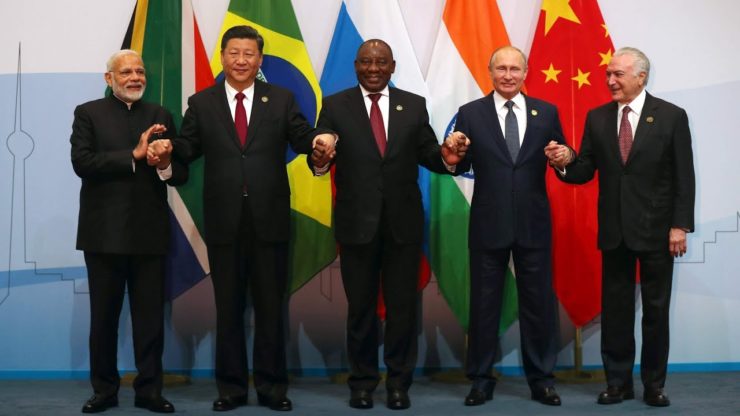
The military conflict between Russia and Ukraine (as also Ukraine’s NATO allies) has brought some very interesting changes to the international political economy. Whereas this conflict has led Europe – working under immense pressure from the US – to stop its purchase of oil and gas from Russia, it has also allowed Russia to divert its resources, both material and otherwise, to regions that were previously on the margins of its priority list. In other words, while the West thought that it would be able to “isolate” Russia by pushing it out of Europe, this “pushback” has led to Russia’s “big entry” elsewhere. This is most evident in Africa, where Moscow has clearly emerged as a big player. During the recently held Russia-Africa summit in Moscow, Vladimir Putin surely reset Moscow’s priorities vis-à-vis Africa, saying that Russia like Africa “defends traditional moral values” by “resisting neo-colonial ideology imposed from abroad.”
This was a very successful event, as the next summit is going to be held from 26 to 29 of July in St. Petersburg, indicating the actual pace of Russia-Africa integration. The West is of course paranoid about it, as it sees Russian expansion in the African continent coming at expense of its own influence.
But what is even more concerning for the West is not just Moscow’s growing footprint in Africa. In reality, it is the geopolitics behind this engagement that is troubling the West. For Russia (as also for its allies, including China), Africa could be one of the global leaders in the multipolar world that both Russia and China are trying to build to get rid of the unilateral US hegemony. In fact, Putin gave this message to his guests from Africa very clearly when he said that “We are ready to jointly shape the global agenda, work together to strengthen fair and equal interstate relations, and improve mechanisms for mutually beneficial economic cooperation.”
Putin’s message is a clear contrast with how the West – especially, former colonial powers – are today seen in Africa. There is widespread discontent. As a 2022 report in New York Times pointed out, “Over the past few years there has been a sharp rise in criticism of France across its former colonies in Africa, rooted in a feeling that colonialist practices and paternalistic attitudes never really ended.”
Russia, on the contrary, is offering trade rather than colonial domination in an otherwise “post” colonial period. Apart from being the largest exporter of arms to the continent for many years, Moscow has also increased its export of oil to Africa, especially since the beginning of its military operation in Ukraine. Russia sent 214,000 barrels a day of refined petroleum products to Africa in December 2022, roughly three times more than in December 2021.
A lot of Russian oil is going to West African countries, such as Ghana, for the first time since 2018. North African countries, such as Morocco, have increased their purchase of Russian oil. Morocco’s imports of Russian diesel, which stood at around 600,000 barrels for the whole of 2021, surged to 2 million barrels in January. Tunisia, which similarly imported almost no Russian oil products in 2021, took 2.8 million barrels of Russian oil products in January and reportedly imported another 3.1 million barrels the following month.
What really stands out is the fact that many African states are rising against the influence of their former colonial masters and are instead tying up with Russia speaks volumes about the current state of international politics. Africa, as it stands, is far from following the US in its bid to create a global coalition against Russia. Africa, on the contrary, is following a policy that best serves its interests, as it continues to buy Russian oil despite the threat of US sanctions. This is clearly a quick glimpse into what international politics would look like in a multipolar setting.
Africa’s role in creating a multipolar world is, thus, not insignificant. It is playing an equally important role via its deep ties with China. For one thing, with China’s Belt and Road Initiative (BRI) being a move against the US geopolitics of China’s containment, there is little denying that Africa’s active participation in China’s BRI is defeating this very politics of containment and facilitating China’s rise as a global power.
Today, China is the largest foreign investor in Africa, with bilateral trade hitting US$254 billion in 2021 and US$282 billion in 2022. Out of this, Chinese exports to Africa were US$165 billion, while it imported goods from Africa worth US$117 billion. Although the trade balance is in favour of China, China has already enabled dozens of African nations to begin exporting some goods duty-free. The new policy includes over 8,800 commodities, with China aiming to increase African imports to $300 billion by 2025. Africa is, thus, benefitting from its trade ties with China.
With Russia being the largest supplier of weapons to Africa and with China being the largest investor, it is clear that Africa is quite well tied with what the US calls “revisionist powers” bent upon undoing the US-dominated, unilateral global system. Africa is one key continent where this dismantling of the old-world order is actively happening via a coalition between local African forces and external powers. For the many African nations tearing apart flags of their former colonial masters, ties with China and Russia are one crucial mechanism that could help them shun cloaks of neo-colonialism much more effectively than has so far been the case. For Russia and China, the more these African states stand against their former colonial masters, the better for the multipolar world they are trying to build.
Salman Rafi Sheikh, research-analyst of International Relations and Pakistan’s foreign and domestic affairs, exclusively for the online magazine “New Eastern Outlook.“